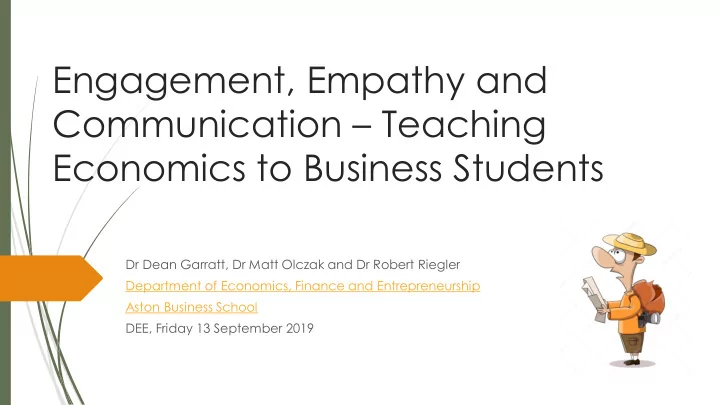

Engagement, Empathy and Communication – Teaching Economics to Business Students Dr Dean Garratt, Dr Matt Olczak and Dr Robert Riegler Department of Economics, Finance and Entrepreneurship Aston Business School DEE, Friday 13 September 2019
What issues can arise from teaching Economics to Business Students? Lower module evaluation scores and negative comments “Why do I have to study economics?” “Economics is boring” Disengaged or disinterested students Frustrated students and staff Solutions? Dumb it down – just teach a “light version” Complaining and trying to hand over module to the next new member of staff These “solutions” are often unsuccessful
Objectives of the presentation Identifying and understanding the sources of the issues Suggesting interventions to mitigate the issues: By recognising differences between economics and business students, it is possible to create an environment that facilitates empathy
Introducing the Tourist Analogy: Analogous to the emotions that business students may feel when studying economics is that of a tourist away from home There are different types of tourist Different people with heterogeneous preferences and different characteristics Holiday destinations differ from home Different language, different traditions, “trip into the unknown” In such an environment tourist guides / travel agents can play an important role in helping tourists to acclimatise
What makes business students different? Getting to know the tourists! Different academic background of business students: Less importance of mathematical foundation of business students (excl. finance students) Other differences Potentially more clearly-defined career paths (especially on vocationally- focused courses, e.g. accounting or marketing) More vocational focus Real world applications Better understanding of the inner workings or functions of firms (black box for economist). Better understanding of accountancy practices Expectation of immediate application More focused on business rather than consumer welfare (Neymotin, 2014) How does the macro-economic environment affect firms but not vice versa
Anxiety Ex-ante expectations and perceptions E.g. Economics is difficult, mathematical, irrelevant to real world, full of diagrams Many students already have anxieties before entering a lecture room the first time! I.e. maths, statistics, foreign language and research methods anxieties (Onwuegbuzie et al., 1999) Relationship between empathy and anxiety Commercialisation: Amplification of anxieties Students’ expectations of getting high mark amplify problem of a non-core module that is perceived as difficult
Cognitivism & Constructivism Conflict of traditions It is easier to understand and deal with material that is presented in a familiar way Students struggle with abstraction and aggregation Increased frustration Conflict of motivations Students engage more when material is put into context, they can empathise with material
Interventions First step: GET TO KNOW YOUR AUDIENCE! This helps to (i) identify suitable module topics, (ii) identify appropriate framing, discourse and tools (ii) choose appropriate teaching approaches and (iii) select effective assessments Information about students from: Benchmark statement Programme directors
Further interventions Creating empathy! Ensure relevance of topics taught Less is more Adjust teaching and assessment activities to audience Choose the right assessment
Summary and outlook: A main cause of conflict is the lack of empathy from students as well as staff Empathy has to start with staff. Through encouraging students to engage with module, they can also develop empathy towards our subject Ways to ensure a smooth journey: Get to know your audience Ensure relevance of topics taught Less is more Adjust teaching tools to audience Choose the right assessment
Thanks for listening! Any Questions?
Recommend
More recommend